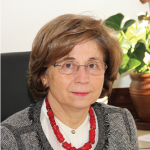
Prof. Ayşe Ayata is the chair of Political Science and Public Administration department. She had her B.Sc from Sociology in Middle East Technical University and PhD from University of Kent, England. She has been a faculty member of Political Science and Public Administration department as well as Gender and Women’s Studies Programme. She has been a visiting scholar in Oxford, Harvard, and Manchester University and Wissenschaftszentrum (Berlin), EHESS (Paris). She has books and articles on gender relation, Turkish politics and social change in Turkey. She has coordinated an FP6 project Global Migration From the Eastern Mediterranean and Eurasia: Security and Human Rights Challenges to Europe (GLOMIG) and has been coordinator of partner institution of FP6 project; Local Dimensions of a Wider European Neighborhood (EUDIMENSIONS), and FP7 projects; Faith-Based Organizations and Exclusion in European Cities (FACIT), European Regions, EU External Borders and the Immediate Neighbors (EUBORDERREGIONS), Bordering, Political Landscape and Social Arenas (EUBORDERSCAPES), one of which is Effective Gender Equality in Research and Academia (EGERA) which is for the promotion of gender equality in Academic World.
Abstract
Labor force participation of women in Turkey is remarkably low. It is not only lowest in Europe, but is lower than many countries with lower development levels. In fact, in terms of Gender Inequality Indicators, Turkey does not stand at a point that is compatible with its economic development level.
However, women’s participation in academia and research is parallel with many European countries. Female academics (and scientists) in all disciplines constitutes 35% of the research staff. And the recent recruits to the profession indicate significant improvement in this ratio. The shewed distribution amongst different disciplines, which is common in Europe, also prevails in Turkey. Relative advancement of women in academic life in Turkey, can be analyzed as an example of concerted efforts and deliberate public policies, despite deficiencies in policy implementation.
I shall be using both Higher Education Council data, to give a broader perspective, but I shall also be using data compiled for EU projects, to give more in depth analysis of gender relation and draw inferences from perceptions of the stakeholders. This analysis will involve perspectives from researchers, including young PhD candidates, as well as from the management.
In this paper, I shall discuss the status of women in research and academia discussing problems as well as advances achieved.

